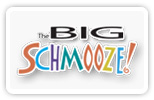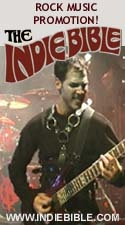School of rock
INDIECAN INVITES YOU TO LEARN FOR FREE FROM
THOSE WHO KNOW - LISTEN AND LEARN.
IndieCan likes to entertain and educate. If you have found your way to this page you are more than a casual music fan. You are an artist that wants to learn more about the biz without re-inventing the compact disc -- Or you are a music fan that looks for more than the glitz of commercial music and media. There is much to be learned from those who have come before us. We have asked the questions that we think you would ask. You won't find auto-reply answers or attitude here. IndieCan would like to acknowledge the candour, sincerity and generosity from these mentors who shared with us.

Podcast with Dan Hill
2009 RESOLUTIONS Do you have a dream? Does it demand attention? Does it ever feel like a curse? A dream is like a baby. It might have been planned or unplanned. Either way, it comes with responsibilities. Janet Fisher, Director of Goodnight Kiss Music, is quoted in the 9th Edition of The Indie Bible as saying, "Sit down with pen and paper. Define EXACTLY what you are dreaming of…" She goes on to talking about "Practicing The Dream" as she reminds readers that just as you couldn't squat down right now and do 150 sit ups without practice, you won't likely write a hit song without practicing your writing every day. As well as definition and practice she also talks about research and rewriting, pursuing the dream, living it and appreciating your dream... READ MORE.
Is Indie still "alternative?" May 10, 2008 Joe Chisholm explores this question in light of Raine Maida, Jeff Martin, 54-40 all major label million sellers who are now DIY or on an indie label. Also - here's to D.O.A. on their 30 year aniversary tour, pioneers of DIY. Check it out (click here)
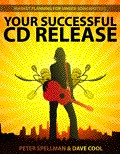
or PDF download today
Most of these "audio extras" are extended versions of interviews that appeared on our radio show. Catering to the constraints of the hour long radio show, we edit the messages to bite-sized portions.
Each guest had generously given so much more than could fit in our Industry Insider radio format. Here, we invite you into the studio with us to listen in on these conversations in their natural flow. Take notes or listen often. If you, like us, are students of the continuing history of music, you are in for a treat.
Moe Berg Indie Hall of Fame Inductee, Producer of The Cliks, Galore, Shannon Briggs, Tacoma Redd, The Left and more
Neil Osborne The lead singer of 54-40, with 11 CDs and countless videos under their belt, 54-40 is at home with indie label True North Records.
Some Devoted Industry Insiders worth listening to:
Canadian Music Week President Neill Dixon
CBC Radio 3's Music Director, James Booth
Brad Schwartz, GM, VP, MTV Canada and CMW Co-Chair
Phil Klygo, WeeWerk Records, Festival Director or CMW
coming soon Diane Foy , Carole Pople , John Capek ,
NXNE BEST OF - Tips from the Experts
1. Biz sense is as critical as talent or songwriting for a musical act
Great Book available in hard copy or PDF download today
2. "Yyou have to like to drive to be in a band"
3. Agents can learn from bands (as well as vice versa), simply b/c bands know the venues, the scene, etc.)
4. Don't worry about getting discovered: just make great music, and we will find you
5. "Play" the music "game" as a challenge.
6. Urban music is probably the most successful at it, b/c they enter into a lot of collaborative projects, they support each other, and this leads to success
7. Take advantage of your "buzz"; it's fleeting, and will probably NEVER come again.
8. We are now dealing with a generation of kids (10-to-12-year olds) who have NEVER paid for music, it's not a concept they are familiar with.
1. Grant Lawrence - CBC Radio 3 host, Jezz Harkin - The Brilliant! Show Host, Julien Smith pioneer of pod casting, In Over Your Head has been on the net since 2004 and Gregg Terrence, president of Indie Pool
2. Podzinger (a digital media merchandising platform) and Technorati (a search engine that combs through weblogs by keyword and for links; it's ccurrently tracking 86.
3 million blogs and over 250 million pieces of tagged social media 3. CBC's podcast is further (than their radio broadcast?). it's also 100% Cancon. This is about 6 million downloads
4. 8% of pod casters make a living doing it.
5. Everyone can podcast. Everyone should. Instead of asking your band's fans to buy your CD and come pay to get in another show, why not send them your favourite five bands once a month. Maybe they'll spread the word.
6. Uncle Seth is a band doing it's own podcast now.
More great tips to come....
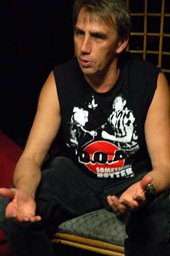
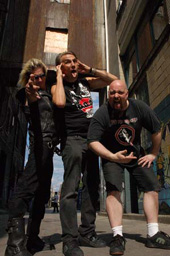

Joe Keithley Interview
Listen now - More DOA pictures
Neil Osborne Full Interview - Listen Now

54-40 started as an indie band, the were signed to Warner, moved to Sony, went back to Do It Yourself Indie. Now they have landed with Canadian Indie label True North. With 11 full length recordings behind him, Neil Osborne's life has changed from his early days in the audience at the Commodore. We had the good fortune to have a visit from Neil Osborne between two sold out 54-40 shows in Vancouver on Friday October 20th, 2006 and Saturday October 21st.
We invite you into the studio with Neil, Joe and engineer, Tom Dobzanski Saturday October 21. This is completely unedited, complete with cell phone's buzzing, um's er's et al. This interview includes about 25 minutes more than the edited Episode 20 version and includes Neils thoughts on music videos, True North Records, philosophy, producing Jets Overhead, how he relates to his fans, the art of living and much more. We start with Neil's thoughts on the annual Commodore 54-40 show...
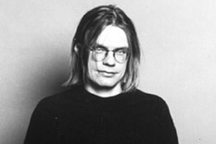 Moe Berg Full Interview - Listen Now
Moe Berg Full Interview - Listen Now Now Moe Berg spent 11 years as the singer and songwriter for The Pursuit of Happiness. The band recorded five records and toured the world extensively. They were awarded one platinum and two gold records. At Canadian Music Week 2006, TPOH was inducted into the Indie Hall of Fame. Moe shares some stories from the early days, which for any musical artist or music fan will be of great interest.
1986 was the beginning of TPOH and in 2005, "When We Ruled" was released, which includes two versions of the anthem, "I'm an Adult Now" plus several hits, one new tune and one Prince cover. More on THE PURSUIT OF HAPPINESS
As a bonus, we'll take you way back to 1988, live at The Pheonix (then The Diamond Club) - check this out:
Moe's resume as a producer is growing. To his credit, he has worked with Robin Black, The Grace Babies, Galore, Tacoma Redd, National Anthem, The Clicks, Vancouver's Left Bank and more. For more, check out http://myspace.com/moeberg
IndieCan will always be grateful to Moe Berg for being the first industry insider and being so generous with his time. You can also hear from Moe in Episode 26, as he dropped into IndieCan studio for the Tacoma Redd gig. If you're here for schoolin' or entertainment, you're in for a treat either way...
Toronto Indie Scene vetran BIG RUDE JAKE was part of Episode 74 - a tale of two Jakes. IndieCan spoke with this vetran of alternative music in Canada for almost an hour and lots of it was not quite day time radio, if you know what I mean. We celebrate this great song writer and he shares some great stories through three decades of Rock-a-billy, Jazz, Punk and Alternative music in Toronto and around the world.
BIGGER RUDER UNCUT - stream on your computer.
BIGGER RUDER UNCUT - right click and keep it
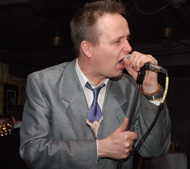
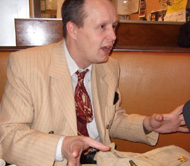

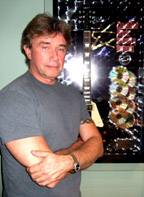
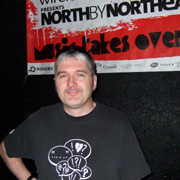

Listen to Brad chatting with Joe Chisholm - unedited

Listen to Brad chatting with Joe Chisholm - unedited
Do you have resolutions for the New Year?
Do you have a dream? Does it demand attention? Does it ever feel like a curse? A dream is like a baby. It might have been planned or unplanned. Either way, it comes with responsibilities.
Janet Fisher, Director of Goodnight Kiss Music, is quoted in the 9th Edition of The Indie Bible as saying, "Sit down with pen and paper. Define EXACTLY what you are dreaming of…" She goes on to talking about "Practicing The Dream" as she reminds readers that just as you couldn't squat down right now and do 150 sit ups without practice, you won't likely write a hit song without practicing your writing every day. As well as definition and practice she also talks about research and rewriting, pursuing the dream, living it and appreciating your dream.
Also in The Indie Bible, Bernard Baur of Music Connections Magazine writes in detail about his 10 steps for success: 1 - Believe in yourself, 2 - Be realistic, 3 - Make a Wish List, 4 - Know your budget, 5 - Take care of business, 6 - Market yourself, 7 - Keep records, 8 - Adapt and adjust, 9 - Keep the faith and 10 - Make it fun.
If you are in the music business and I haven't heard of you - or more importantly, if my sister (who only listens to FM radio for her music) hasn't heard of you, then you may want to think of yourself as more a "student of the music business" than "in" the music business and that's OK. We all had to start somewhere. I just saw a Youtube video of Led Zep's Jimmy Page at age 14 in an early band.
Turns out that at that age his dream was to be a biologist and cure cancer. I guess that sort of thing is referred to above in "Rewrite Your Dream" Enjoy the video, but come back to the idea that if you don't want 2009 to be just like 2008, you need to learn something new about the business every day if you can. There were 2.5 Million new profiles on Myspace from the USA alone last month. There is a little competition out there and if you want to make it, you're going to have to out smart the completion.
It's not that hard. I read a disturbing fact about what a small percentage of North Americans completed reading even one book in the last year. So spend a day a month in the library looking threw music business books and you're already ahead of 2/3 of the crowd that will never catch up.
Maybe the Indie Bible is a tool of the trade you need to get you where you want to go. For $40 to $50 depending on how you buy it, you get:
" 4200 publications from around the world that will REVIEW your CD!
" 3400 radio stations from around the world that will PLAY your songs!
" 500 vendors and services that will help you to SELL your music!
" 330 sites where you can UPLOAD your band's music files!
" 500 useful resources to help PROMOTE your band!
" Over 50 articles that will help your career to MOVE forward rapidly!
Of course having it won't ensure your success. But using it as a reference and making these contacts once a week will. Here's something else that might have some good karma to it. Order Indie Bible from this link and they will pay IndieCan $5 which we'll put right back into our radio show and web site.
So reading about the business is one thing that can help make 2009 different from 2008 for you.
Find some other things to do that are different than what you did the year past. Here's IndieCan's 3-Free Ideas if you are in the music business and you want to succeed. By the way don't worry that everyone else can read these. Studies show they won't - and those that do, aren't going to do anything about it anyway. Some people just keep looking for good ideas but never try any of them. So if you use these, let me know how it works for you - and I don't expect my phone to be ringing off the hook.
3-FREE IDEA # 1: Play some places you wouldn't generally play. IndieCan rented a table at the Halifax Zine Fair when we went to the Halifax POP Explosion in 2008. We have never been to a Zine Fair before. We sold more IndieCan T-shirts and got more people on our mailing list than any other event we attended in 2008. So find who runs flee markets in your town and offer to play for free there if you can sell your stuff. You may end up planning a country wide tour of flee markets instead of night clubs this year. Who knows? Try it.
3-FREE IDEA # 2: Send your email subscribers a list of 5 bands you know and your fans have never heard of but you think they will enjoy. Tell them you're out there every week, playing with other great artists and it occurs to you that you could help people find new music they are going to like. If you have a story about any of these artist or there is something you admire about them, share that with your fans. Make it easy for your fans to buy this new music. Include hyperlinks to the bands web site or CD Baby page, or iTunes or PureTracks page or what ever.
Have you figured out how this works in your favour yet? Let's say you send the same people an Email every week asking them to buy your CD again, or come see your show again. Is that the kind of Email list they will recommend their friends join? Your about as much fun as a telemarketer, aren't you? But if you keep sending people time-saving, value added services you become referable. Want others to help promote you? Become referable. Do something that's different than the other artists Email lists that your fans have singed up for and maybe they will pass your name along. Oh, and what happens when other bands find out you're promoting their music? Is that going to make friends or enemies? If they appreciate it, ask them if they would send your latest press release to their fans. Do the math - even if all they do is tell their fans that your band is promoting their band, they just put your name in front of 300 people who love music but have never heard of you. If you help out 60 bands, they tell 18,000 people.
3-FREE IDEA # 3: Sell other stuff at your merch table. Don't get carried away, but if you see something really cool at - let's say that flee market you play at this year, ask if you can buy ten units whole sale and tell them you'll sell it for them when you play your shows. Or sell another bands CD or stickers or buttons. No body owns one CD. No one has one button, on sticker, one shirt. If you're going on the road for more than two weeks, offer to take some of your favourite home-town bands stuff with you. That way your merch table can go on the road and represent your whole town or scene. It gives you something more to talk about at your merch table. It gives a reason for someone who already has your stuff to come to your table and maybe they'll bring someone along who doesn't. And maybe… over the next year, reciprocity will kick in and you'll have other people selling your stuff at their store or flee market or merch table. And now you can up-sell and package. They can have your T for $15 or Band X's T for $15 or they can have both for $25. Or bring your computer along. You could make your own podcast of your band and 9 other bands and upload the mp3 to your fans iPod for $5. I am sure you could find 9 bands that would let you use one of their songs to help promote them to your fans.
If you don't know where to start, contact us. You can have IndieCan buttons or T-shirts at wholesale. It gives you something new to talk about from the stage and at your table and what else are you going to sell someone who bought your T-shirt and CD last month? You may be able to make your merch table earn you 3 to 5 times what it did last year.
Pick one idea and try it. All of us at IndieCan wish you luck for 2009. We're all in this together.

For two years I have hosted IndieCan Radio; a guerrilla radio-magazine of independent music life in Canada with "live at IndieCan" performances and band interviews, industry insider segments and a collection of compelling tunes from coast-to-coast that we pick up from festivals, mail and referrals. Our radio show started as a podcast two years ago, a college/community radio station at Durham College picked it up and then we had weekly deadlines. Then an internet radio station (Radio3x.com) which never lasted, picked us up. XM Satellite Radio on Channel 52, The Verge The Verge has taken a chance on us, 6 FM stations in Canada, ErrorFm.com + we still post our entire archive at www.indiecan.com to which 120 countries visit to see what's new each week in Canadian indie. I don't know what the real numbers of listeners are. I hope it helps music fans get excited and music makers earn a living.
The Phenomena: In our first year I had a candid interview with Neil Osborne of 54-40 who, in the 80's signed with Warner, then they were with Sony and when it came time to renew they signed with a boutique independent label called True North, here in Canada. It was still a novelty back then for a major label artist to go Indie; the Pretenders had done it, The Bare Naked Ladies had done it, Dolly Parton had done it. That Neil Osborne interview was episode 20 of our show, October 2006.
Episode 48 was the summer of 2007. We talked to D.O.A. front man, activist, grand-daddy of D.I.Y., Joey "Shit Head" Keithley. He explained that Do It Yourself was not an artistic option for many punk bands in the late '70s. No one else would have help them or sign them so they learned how to book recording time themselves, book and promote shows (without the internet) produce records, send them to specialty radio stations around the world and sell them off the stage. That is 30 years since the first single, "Disco Sucks" and D.O.A. is now on tour celebrating 30 years of hell-raising with a purpose. "Talk - Action = 0" is a D.O.A. theme and when you are D.I.Y. I guess that's obvious, but in the case of Joey Keithley it's not a marketing ploy. He sings anarchy on the stage and runs for the alternative Green Party at home in Vancouver where his popular vote in 2001 in the provincial election was second only to the party leader. So, in the day, D.I.Y., for bands like D.O.A.., "indie" was the alternative to the normal means of music distribution and management and an anomaly.
Since then we spoke to Raine Maida on Episode 78 who sold over 4 Million Our Lady Peace records and is now a solo, indie artist. This week on Episode 83, Jeff Martin is our guest. Tea Party did OK as a major label act, didn't they? But Martin sees no pay-off, no benefit for having his art form managed by a major label. Take any of these examples of artists who have changed their business model and you'll hear counter arguments that record sales had sagged with each of them and it was the label that unloaded them. I have heard the argument that these "seasoned pitch-men" are putting a brave face on and spinning an up-side slant on their new lot in life.
Well, guess what - everyone is selling fewer records than they use to. Look at the numbers of the top ten records sold in 2007 and compare them to 2000. #1 sold 40% less in '07 compared to '00. It's the same with # 10 and everyone in between. So who cares who initiated the end of these contracts between "stars" and their major labels? The fact is that the model doesn't work for either side.
What This Means: Is Indie the new normal? If so, then Indie isn't alternative any more - it's mainstream. I just mentioned a 40% sag in top-ten record sales over seven years. I don't know that music consumers bought 40% less music. I heard Alan Cross say that in 2000 25,000 records were released world-wide. In 2007 750,000 records came to market. So maybe it's a fragmented market. Jake Gold (Tragically Hip, The Cliks, Canadian Idol, The Management Trust) tells me he likes to call it a "niche" market place. Why not put a positive spin on it? It's true; if you are a sitar/ steel-drum blues band you may have a limited audience world wide. But maybe you can sell 50,000 units world wide if every devoted sitar/steel-drum blues fans wanted your music. Years ago - no go. A major would have to print and distribute 2 Million vinyl discs to sell those 50,000 and then pay to have all the others returned to the warehouse. I can't see how to make money doing that - for anyone. But in Canada, 50,000 units would be a gold record. The internet allows "niche" bands and "niche" fans a way to find each other and do business with each other.
Montreal's Julien Smith who hosts and produces the " In Over Your Head " podcast makes the point that in the 60's the #1 TV show was "I Love Lucy." It reached something like 75% of households in America. CSI is the #1 show in the world now. It reaches 8%. Are less people watching TV? Of course not - there are more "niche" TV watchers now watching all news, all music, all fishing, all porn, all what ever. Not only are their more choices. There is less loyalty. How many people still see every episode of anything? Click, click, switch, switch.
Our radio show audience has grown from about 400 people who streamed or downloaded the show in the spring of 2006 to about 70,000 now. I think it's cool that unsigned artists are performing to festival size crowds every week. Is it because our show or the music is so compelling? Maybe, but the point is that every day more and more people leave commercial mediums for their news and entertainment and seek alternatives. We produce one of those alternatives and music fans who are disenchanted with what Peter Spellman of Berklee College of Music calls, "...the force-fed sonic swill of commercial radio," are googling, talking to their friends, reading blogs, being discerning consumers.
Music festivals are a buzz with panels discussing an industry in crisis. I am not an industry. I am a music fan. The blood in the streets doesn't phase me, because the music in the air is enchanting. What it all means is this is a renaissance for music fans. Last night I left my home in Toronto for The Hamilton Spring Music Festival. I saw local bands Dean Lickyer and The Apollo Effect. I saw Ireland's Vesta Varro. I saw Austin's Grady and Toronto's The Salads and The Northern Pike's Jay Semko; every band Indie; every band part of the new "normal." Yes, indie isn't alternative any more. Major Label is now an oxymoron. Maybe the word "indie" will go the way of the term "new wave" from the late '70s. What does it all mean? The universe is unfolding as it should. To coin a line from the '70's Supertramp album on A & M, no longer in existence, "Crisis? What Crisis?"

There are some new tools available for artists at IndieCan.com and hot off the press is a $17 co-write by What is Indie producer Dave Cool and Berklee College of Music Director of Career Development, Peter Spellman. For what it's worth, I have a few things to say about spending money to make money in general.
Did you know that I am a financial planner? No kidding - since 1989 my own guitar has spent way too much time in it's case while I aided and educated people in saving money, spending no more than they needed to and how to prepared for a rainy day. If you only know me as "indie music guy" check this out: http://www.joechisholm.com - it's really me.
So I am predisposed to encouraging people to save more, spend less. As an aside or better stated, another aside, I am somewhat critical about the seemingly cannibalistic practices in the music biz. By that I mean that the industry is suffering through new consumer habits that see less and less money being spent by the public on music. So where's the money? Artists are still spending like drunken sailors - let's make the money off of them! I am critical of festivals and "band battles" where the bulk of the budget is shouldered by artists.
Regarding books, I was asked to review "Secrets of the Millionaire Mind" and I concluded the only one that would make $1Mil from that book would be the author. No one has proved me wrong on that one. So, what about spending your money on "Your Successful CD Release?" For starters, in the interest of full and proper disclosure, if you buy it from the IndieCan.com web site, we get some of that $17 - I don't know how much because I didn't read the fine print but I will tell you this - Our end will go to deferring the costs of the web site and radio show and you can be rest assured, if we turn a profit, I'll spend the money on you.
So is it worth it? If you are open-minded to how to run your business better, I bet it will. Owning the book won't make you money. Instead we have to weigh the merit of the ideas inside. What I like is they actually draw on the experience of career artists like Ember Swift who has put out 10 do-it-yourself CDs. She's not a teacher or an author; she makes a living making music. I also note that the books a damn site cheaper than The Berkley School of Music. I figure the sales-pitch is that if it helps you sell 2 more CDs then you made your money back but I think there's more to it than that. A CD release is going to be a career altering experience for you, either positive or negative.
All eyes are on you during your CD release and it will show either forward or downward momentum so this isn't something to approach lightly. I have had guest on my show warn of the perils of zealous artist booking a CD release date before they have taken possession of the product, over confident that it will be there on time and the artwork will be perfect. There's a lot to learn about being in this business and I believe that smart ones learn from their own mistakes, wise ones learn from the mistakes of others, so why re-invent the compact disc when the steps to make one are laid out for us?
As I said, a CD release isn't just another day, just another arrow in the quiver. Major labels will sit on a CD as long as they feel they need to until all the ducks are in a row to give the art work the maximum chance to succeed.
I think that kind of know-how is worth $17.
Here's the link to look at the book:
Here's the press release Dave Cool & Peter Spellman launch new eGuide "Your Successful CD Release" Director/Producer of documentary film "What is INDIE?" and Director of Career Development at Berklee College of Music team up to write empowering marketing guide for independent artists Montreal, November 7th, 2007 - After directing, producing and self-releasing the documentary film "What is INDIE?" last year, Montrealer Dave Cool has released his first follow-up project to the film, but this time he has turned his attention to writing.
Teaming up with Peter Spellman, Director of Career Development at Berklee College of Music in Boston, Dave Cool wrote the new eGuide "Your Successful CD Release" based on 3 of Peter Spellman's classic books: "The Self-Promoting Musician", "INDIE Power" and "INDIE Marketing Power". Along with the powerful information taken from those books, Dave also added his own insights and experience to create a uniquely powerful tool that is ideal for artists who might feel like they don't have the time to read several full-size books on marketing and promotion.
"Peter is one of the foremost experts in the music industry and his work has had a tremendous influence on me over the years, so to get the opportunity to co-write a book with him was a huge honor." - Dave Cool
"Dave is a rising talent in the music industry, and after showing his skills as a filmmaker with "What is INDIE?", he has now shown he is a prolific writer as well. I'm glad to be working with him." - Peter Spellman
Using an easy to follow, step-by-step structure, "Your Successful CD Release" is a results-driven quick-action marketing guide that coaches artists through the process of putting together a marketing and promotional plan, and features a comprehensive look at the broad range of possible revenue streams & opportunities available to singer-songwriters.
The guide includes many empowering resources to help artists with each aspect of their marketing plan, along with sample templates to track the progress of their promotional campaign, a straightforward spreadsheet template for a marketing budget, and a rich list of follow-up resources that artists can use to take immediate positive action in their career.
As an added bonus, "Your Successful CD Release" also includes advice and insight from full-time independent singer-songwriters so readers can get a sense of what it takes to be a full-time indie musician. Among those interviewed for the guide were Canadian indie artists Ember Swift and Rob Szabo.
"Your Successful CD Release" is available as a PDF download for $16.95 through Peter Spellman's company Music Business Solutions: http://www.1shoppingcart.com/app/?af=681790
Workshops based on the guide are being planned for Montreal, Toronto, Boston and New York City. Details TBA.
About Dave Cool: Montrealer Dave Cool is an author, filmmaker, and compassionate musician's advocate dedicated to helping and empowering independent artists (and yes, that's his real name!). He is also the founder of Stand Alone Records, a unique record label that actually encourages artists not to sign records deals. Instead, the company looks to inform, inspire and educate artists with inspirational artist success stories, free resources, guides and books, as well as affordable coaching and consulting services. A recognized expert in the music industry, Dave has done interviews for CNN.com, Newsweek Magazine, CBC National Radio and CTV, as well as for scores of newspapers, radio shows and podcasts.
About Peter Spellman: Peter Spellman is Director of Career Development at Berklee College of Music, Boston, President of Music Business Solutions, and the author of several handbooks on the music business. A recognized expert on music industry trends, the impact of the Internet on music, and music career issues, Peter is a popular speaker at colleges, universities, and music conferences. In addition, Peter teaches courses on entrepreneurship, music publishing, and music marketing at the University of Massachusetts-Lowell.
Indiecan is accepting donation support the radio show and Canadian Indie Music.Click here to donate now.





